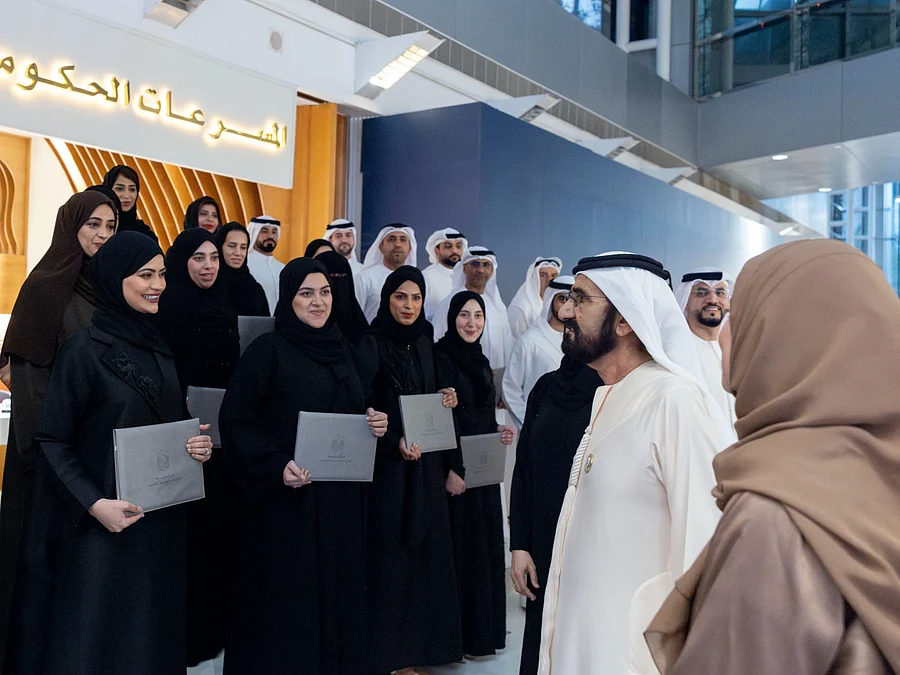By Khitam Al Amir
Dubai: His Highness Sheikh Mohammed bin Rashid Al Maktoum, Vice-President and Prime Minister of the UAE and Ruler of Dubai, on Wednesday attended the graduation of a new batch of graduates from the Government Accelerators Diploma..Participants in the Government Accelerators Diploma took on 35 challenges across four core areas. Of the challenges, 21 were related to government efficiency and eliminating bureaucracy, 8 required participants to suggest solutions leading to enhanced quality of life, 3 touched on community services, and 3 tested participants on their overall awareness and knowledge dissemination capabilities.The Government Accelerators Diplomais part of national efforts to promote challenge-based talent development across various spheres of government work. It aims to build national competencies, train talent in accelerator tools and methods, and equip future leaders with the creative skills needed to advance a culture of acceleration in their organisations.Awards ceremonyThe Government Accelerators Center organised an awards ceremony recognising outstanding projects that emerged courtesy of the Government Accelerators Diploma programme. The event recognised three pioneering projects that stood out amongst ideas and concepts that emerged across five cohorts of the diploma programme. The most impactful and sustainable projects were feted, including the ‘Traffic Speed Limit Reduction System,’ the ‘Hayat’ organ donation initiative, and the ‘Robotic Process Automation’ project. Selected from amongst 86 submissions, these projects stood out for their significant and lasting impact, based on criteria such as sustainability, innovation, measurability, relevance to government challenges, and societal benefit. The ‘Hayat’ organ donation initiative, submitted by the Ministry of Health and Prevention as part of the third cohort, was recognised for its transformative role in raising public awareness and increasing participation in the national organ donation programme. The project aimed to boost organ donor registrations in Fujairah and achieved a 50% increase within 100 days through a comprehensive awareness campaign targeting universities, schools, government and religious institutions, along with strong engagement from community influencers. The ‘Traffic Speed Limit Reduction System Based on Weather Conditions Using Artificial Intelligence,’ submitted by the General Command of Abu Dhabi Police during the first cohort, was also recognised. The project is a smart system that uses AI to analyse meteorological data and traffic-related big data. It automatically adjusts speed limits through electronic signboards and sends alerts to drivers. The system contributed to a 100% reduction in severe accidents on some roads and improved traffic response time by 90%. The project received the ‘Ongoing and Sustainable Project Award’ based on criteria such as sustainability, scalability, innovation, the availability of measurable data, future development plans, and collaboration between entities.The ‘Robotic Process Automation’ project by the Dubai Electricity and Water Authority (DEWA) also earned pride of place during the event. It leverages artificial intelligence and robotic processing to automate operations and support human efforts. The project enhances DEWA’s ability to deliver smart, sustainable solutions that address government challenges, improve productivity, streamline operations, and reduce costs. Since 2020, the project has saved an estimated Dh24 million – equivalent to around 161,000 working hours annually.Collaborative effortGovernment Accelerators, launched by Sheikh Mohammed, represents a forward-looking operational model. The initiative brings together teams from the government, private, and academic sectors who work collaboratively to drive innovation, deliver exceptional services, exceed targets, save time, and overcome challenges.Since its launch in April 2019, the Government Accelerators Diploma has qualified 217 participants from more than 135 government, private, and semi-government entities. They worked on developing solutions and launching projects and initiatives addressing 121 challenges, ably supported by approximately 750 government staff members from the accelerator teams.
